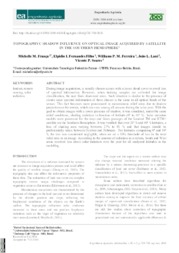Topographic shadow influence on optical image acquired by satellite in the southern hemisphere.
Topographic shadow influence on optical image acquired by satellite in the southern hemisphere.
Author(s): FRANÇA, M. M.; FERNANDES FILHO, E. I.; FERREIRA, W. P. M.; LAN, J. L.; SOARES, V. P.
Summary: During image acquisition, is usually chosen scenes with a lesser cloud cover to avoid loss of spectral information. However, when training samples are collected for image classification, the user finds shadowed areas. Such situation is similar to the presence of clouds since spectral information of these classes is the same in all optical bands of the sensor. This fact becomes more pronounced in mountainous relief areas due to shadow projection on the terrain, which can vary among all seasons during the solar year. With the goal to obtain images with a lower presence of shadow, it was simulated, under the same relief conditions, shading variation in function of latitude (0º to 40º S). Solar radiation models were processed for the days and times passages of the Landsat TM and ETM+ satellite on the Southern Hemisphere. It was verified that over 30º S and 40º S latitudes, a loss of shading area varying between 27% to 91 % and that images should be preferentially taken between October and February. For latitudes comprising 0º and 10º S, the loss was considered negligible, when we set a 10% threshold of loss in the total valid area in an image. According to the amount of radiation in a terrain, South and West areas received less direct solar radiation over the year for all analyzed latitudes in the modeling.
Publication year: 2018
Types of publication: Journal article
Unit: Embrapa Coffee
Keywords: Landsat, Remote sensing, Solar radiation
Observation
Some of Embrapa's publications are published as ePub files. To read them, use or download one of the following free software options to your computer or mobile device. Android: Google Play Books; IOS: iBooks; Windows and Linux: Calibre.
Access other publications
Access the Agricultural Research Database (BDPA) to consult Embrapa's full library collection and records.
Visit Embrapa Bookstore to purchase books and other publications sold by Embrapa.

